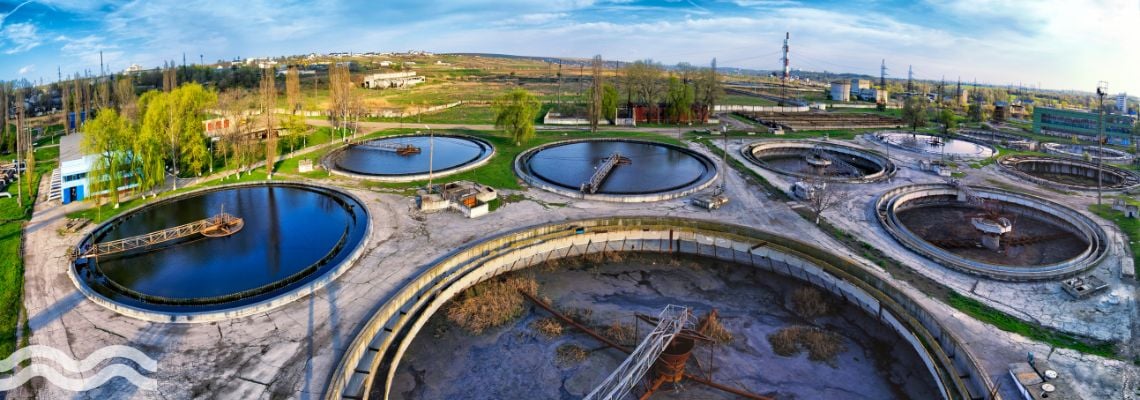Sewage sludge circular economy project receives $2 million funding
UK utility Yorkshire Water will lead a consortium that will test the commercial viability of sewage sludge gasification which it hopes will help destroy pollutants, provide a sustainable alternative to disposing of sludge on land, and aid the circular economy by producing sustainable and usable by-products.
Potential uses of gasification by-products
If the technology proves itself, not only will it destroy harmful pollutants, but it will create carbon-rich biochar, vitrified ash 'stones' and hydrogen-rich synthetic gas, which all have a number of sustainable uses.
The project will test the potential for biochar to be used in a variety of different ways: in wastewater treatment, for removing phosphorous; in brick manufacturing; to increase water and nutrient retention in soil; and also for carbon sequestering in soil.
The synthetic gas is a blend of hydrogen, carbon monoxide, carbon dioxide and methane, which could be used to produce green hydrogen with its potential to be used as an energy source for wastewater treatment. There is potential for use in aviation fuel.
Dr Danielle Hankin, innovation programme manager, Yorkshire Water, said: “Converting sewage sludge into gas, biochar and ash 'stones' opens up new, more sustainable uses for this waste product. We’re proud to be pre-empting changes in legislation and consumer attitudes, by delivering a groundbreaking technology that benefits customers, the environment and future-proofs the water industry.
She added: “Once proven, the Gasification process will produce sustainable wastewater treatment media and construction material, generate green electricity, and could create high-value products such as biomethanol, aviation fuel or hydrogen. Our work represents a pivotal step in driving the UK towards a greener, more resource-efficient future.”
Gasification of sludge
The project will test the commercial viability of applying gasification to 100 per cent of sewage sludge to destroy micropollutants, including per per- and polyfluoroalkyl substances at Yorkshire Water’s gasification demonstration plant in Huddersfield. Over a 20-week period, sewage sludge will be dried and gasified in batches, the first attempt to do this on a large-scale.
The gasification process produces four times as much renewable energy from sludge as current anaerobic processes, creating huge savings on carbon and energy.
The UK produces an average of 1.4 million tonnes of solid sewage sludge every year, the majority of which is either anaerobically digested on land or incinerated. Neither of which are sustainable or environmentally-friendly. The consortium estimates that no solid waste would make its way to landfill, following the process.
Tackling phosphorous is also high on the agenda, and the estimated usage and cost of using ferric sulphate coagulant is seen as too high, rising to £19 million a year by 2025.
Future wastewater treatment plant applications
The process once proved could either be applied at individual treatment plants, or in a central hub. The treatment of sludge will help plants become self-sufficient, with the consortium suggesting 80 per cent of the energy present in the sludge will be converted to reusable energy that power the plant. It is estimated that every 10 tonnes of dry sludge will produce 8 megawatts of heat and gas energy. Excess energy can be used in other areas of the business or sold externally, for example to power homes.
With Yorkshire Water alone producing 160,000 tonnes of dry sludge every year, the potential for energy production is vast the region alone. The gasification process would itself be energy neutral.
As important however is the fact that all the sludge will have been consumed and processed so there will be no solid residues returning to land and all contaminants like microplastics and forever chemicals such as PFAS will have been safely destroyed.
Ofwat Innovation Fund winners
The Ofwat Innovation Fund awards a total of £40 million to successful projects through its Water Breakthrough Challenge. The challenge is run by Challenge Works with Arup and Isle Utilities, it is designed to drive innovation through collaboration, with the goal of tackling the water sector’s biggest challenges.
Helen Campbell, senior director, Ofwat said: “There are big challenges in the water industry that must be solved, some are well known and others are less so. In our fourth Water Breakthrough Challenge we called for solutions with potential to deliver wide-scale, transformational change for customers, society and the environment – and that’s exactly what today’s winners have done. From raingardens to prevent flooding to green energy from treated sewage, innovations to cut the water sector’s carbon footprint to robots that patrol the pipe network, the winners are all helping shape a more sustainable and efficient water sector.”
Yorkshire Water leads the Advanced Thermal Conversion (ATC) Gasification Technology consortium, which includes Enertecgreen (ETG), Queen's University Belfast, Carbon Trust, Thames Water, United Utilities, Anglian Water, Scottish Water, Irish Water, Northern Ireland Water, Southern Water and Wessex Water.
Enertecgreen will provide the gasification technology for the project.
We promise never to send you spam and you can unsubscribe at any time!
